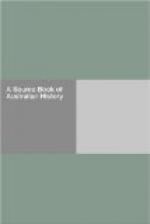On Dec. 30th our wooding and the watering of the ship were completed, the rigging was refitted, the sails repaired and bent, and the ship unmoored. Our friends, the natives, continued to visit us; and the old man with several others being at the tents this morning, I ordered a party of marines on shore to be exercised in their presence. The red coats and white crossed belts were greatly admired, having some resemblance to their own manner of ornamenting themselves; and the drum, but particularly the fife, excited their astonishment, but when they saw these beautiful red and white men with their bright muskets, drawn up in a line, they absolutely screamed with delight; nor were their wild gestures and vociferation to be silenced but by commencing the exercise, to which they paid the most earnest and silent attention. Several of them moved their hands involuntarily in accordance with the motions; and the old man placed himself at the end of the rank, with a short staff in his hand, which he shouldered, presented, grounded, as did the marines their muskets, without, I believe, knowing what he did. Before firing, the Indians were made acquainted with what was going to take place; so that the volleys did not excite much terror.
PORT PHILLIP
Monday, April 26th, 1802. On coming within five miles of the shore at eleven o’clock, we found it to be low and mostly sandy; and that the bluff head, which had been taken for the north end of an island, was part of a ridge of hills rising at Cape Schanck. We then bore away westward, in order to trace the land round the head of the deep bight.
On the west side of the rocky point there was a small opening with breaking water across it; however, on advancing a little more westward the opening assumed a more interesting aspect, and I bore away to have a nearer view. A large extent of water presently became visible within side; and although the entrance seemed to be very narrow, and there were in it strong ripplings like breakers, I was induced to steer in at half-past one; the ship being close upon the wind, and every man ready for tacking at a moment’s warning; the soundings were irregular between 6 and 12 fathoms, until we got four miles within the entrance, when they shoaled quick to 2-3/4.
The extensive harbour we had thus unexpectedly found I supposed must be Western Port, although the narrowness of the entrance did by no means correspond with the width given to it by Mr. Bass. It was the information of Captain Baudin, who had coasted along from thence with fine weather, and had found no inlet of any kind, which had induced this supposition; and the very great extent of the place, agreeing with that of Western Port, was in confirmation of it. This however was not Western Port, as we found next morning; and I congratulated myself on having made a new and useful discovery, but here again I was in error. This place, as I afterwards learnt at Port Jackson, had been discovered ten weeks before by Lieutenant John Murray, who had succeeded Captain Grant in command of the Lady Nelson. He had given it the name of Port Phillip, and to the rocky point on the east side of the entrance, that of Point Nepean.




